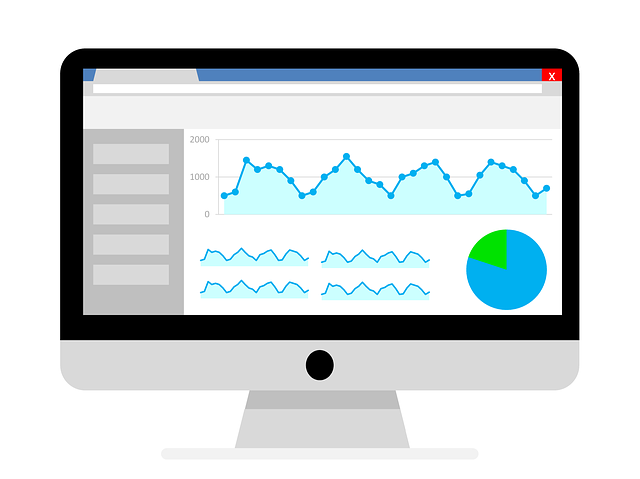7 Best SEO Tools for Internet Marketers
Search engine optimization has been a marketing thing for a long time, essentially since Google changed the way people access information on the internet. As Google took on the task of indexing and ranking public websites and its user base grew from thousands to millions and now into the billions, tools have been created for marketers to get a piece of that huge audience.
Getting visibility from Google’s search engine ultimately comes down to publishing content on a website and getting inbound links to that website. As simple as that sounds, there are thousands of different ways of looking at the ways your pages, domain, website, etc. interact with Google and other search engines that have followed its lead so that you can maximize how much exposure your website, company, or organization receives.
I’m going to share with you the 7 best tools that I know of for doing search engine optimization. Some of the functionality of these top 10 tools for SEO overlap, while there are also some unique features provided by each one of these software solutions for automating or otherwise improving your approach to SEO.
The Objective of SEO
The objective of search engine optimization is to have your web pages, your content show up at the top of Google’s search engine so that your purpose in publishing on the internet is achieved. When Google matches up the idea, the service, or the product you’re promoting to the people who would be the most interested, your target audience, then you’ve accomplished the
That SEO objective description I just provided is obviously simplified, and there are lots of factors that go into getting someone from Google’s search engine to your web page. If your page ranks #3 for a specific keyword phrase and you have a title for your page that entices Google searchers to click through, you are achieving success with SEO, although you could be achieving more.
The overall objective of doing SEO is to get your web pages to rank as highly as possible for keyword phrases that you are targeting.
Keyword Phrases
Keyword phrases are essentially the currency of SEO. In order to attract the most targeted traffic as efficiently as possible, it’s important to identify what search phrases your target audience is using to find what you’re promoting.
Search Rankings
The search rankings part of the SEO objective involves getting your web pages to rank towards the top of the search engines for the keywords that you are targeting. Getting better search rankings includes not just writing and publishing good articles (along with images and videos), but also developing ranking “authority”, which is what Google and most search engines use to determine how important a web page is based on links and other references to any particular web page.
The video below from Google gives a good summary of how their search engine works. Understanding this information is critical for choosing the best SEO tools to use.
Determining which SEO tools are the best involves focusing on the overarching objective of ranking highly in Google for the keyword phrases you are targeting for your content. With that understanding, the best SEO tools will allow you to do a combination of the following:
- Determine which keyword phrases are being used to search for whatever it is you’re promoting
- Determine how competitive it is to rank highly for the keyword phrases being used by your target audience
- Evaluate the effectiveness of your pages in targeting those keywords
- Evaluate the ranking authority of your web pages and of your website’s overall domain
- Track the rankings of your web pages based upon the target phrases you’ve chosen
- Provide data-driven feedback and insights on where you can make improvements
With that context, I’ll dive into the tools I think are best for doing SEO.
Google’s Own Tools
When Google first started indexing the internet and publishing their search engine, most of the data they had was held close and not shared with marketers, webmasters, and others who could benefit from their user data. However, over the past 20 years, Google has become somewhat of a partner with people who want more traffic from their search engine. Somewhere in early 2000s, Google started producing tools that website owners could use to understand how Google viewed what they were posting. From what I observed during this transition from being a mostly black box to Google providing lots of transparency to website publishers, Google’s reasoning seem to be that if they worked together with website owners rather than view them all as spam threats, more could be done to help the best content rank at the top of Google’s algorithm. That “partnership” between Google and website owners has evolved into the creation and publishing of the top three tools for SEO I’ll describe below.
Google AdWords – Keyword Planner
Google collects data from the billions of searches done every day, and it feeds that data into a tool that is available for free. Google publishes their Keyword Planner tool as a resource for webmasters who are running paid Google Ads campaigns, but it can be used by people who are just after organic (non-PPC) traffic from Google.
You can set up an AdWords account by going to AdWords.Google.com, or you can follow the link directly to the Keyword Planner tool. You’ll need to have an AdWords account and be logged into it in order to use Google’s Keyword Planner tool.
To access the Keyword Planner tool, after you’ve logged into your AdWords account, click on the Tools and Settings link at the top of the page in the menu bar.

The Keyword Planner gives you the ability to enter keyword phrases related to the topic you are writing content about and get feedback from Google’s own data about that search phrase, including the average monthly volume of searches for that phrase and a measure of how competitive that search phrase is among people who are bidding on the term for PPC campaigns.
Keyword Planner also shows you other relevant search terms along with their search volume and competitiveness.

There are lots of different ways that people doing content publishing and SEO use Keyword Planner. My favorite thing about it is that it gives you an idea of what Google is seeing among the billions of searches they see every day. I often use Keyword Planner to get an idea of sub-topics that I should include in an article.
Google Analytics
There’s no better way to understand how people are getting to your website and what they’re doing once they get there than having an analytics program installed on your website. There are lots of web analytics tools available, most of them requiring subscriptions to use.
Google Analytics is free, and it works well. It’s easy to install on any website, and it provides tons of critical information about how traffic is getting to your website and what’s happening with people who are accessing your pages.
For SEO purposes, I most like the Acquisition -> Organic Search reports, which help me to see which pages are getting the most search referrals as well as some of search terms that are sending traffic to my pages.
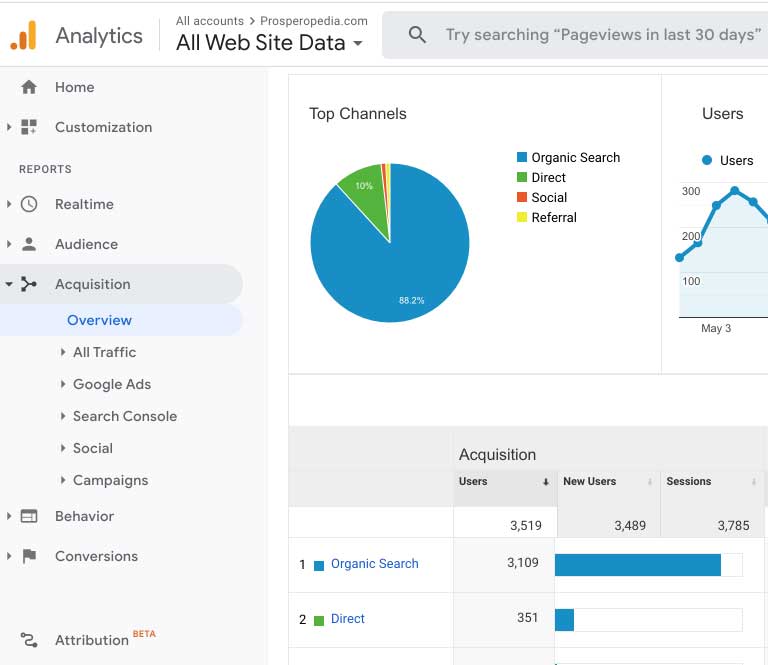
Google Search Console
Price: Free
Google’s Search Console (formerly Google Webmaster Tools) tool allows website owners to see a lot of great SEO-related information Google provides about their website, and it also gives a portal for SEO people to fix technical issues, submit sitemaps, and otherwise make sure they’re on good terms with Google.

There’s no better way to get feedback about how your pages are performing and to uncover any problems than to get it straight from the horse’s mouth, in this case the far and away leader for SEO: Google.
Moz.com
Price: starting at $99/month
Moz.com (formerly SEOMoz) is one of the original providers of SEO tools. Over the past decade, Moz.com has spent a lot of money and built up a lot of resources to give SEO people access to data that can help them do everything from making better decisions about which keyword phrases to target to determining what it will take to rank near the top for specific terms.

Moz’s SEO offering includes the following helpful tools:
- Moz Pro Campaigns: allows you to track your rankings over time for keyword phrases you choose
- Moz Local: provides information for you to use to promote local businesses. Google’s formula for ranking location specific businesses is very different from ranking web pages. This tool focuses on the maps aspects of Google’s search algorithm.
- Keyword Explorer: This tool includes a database of search phrases along with gauges for several metrics to help you decide which keywords to target and in what priority.
- Link Explorer: (this is my favorite of the Moz SEO toolset) This tool allows you to look at the link profile (as its represented by Moz’s index of the web) to see what ranking authority (an estimate of how well Google trusts the page and the domain it’s hosted on) pages have. I also use this tool to check on competitor links when I’m doing link building.
- Rank Checker: If you just want to do a quick ad hoc check of a web page’s current ranking for a specific keyword, you can use this tool, which also allows you to then track that phrase’s ranking over time outside of an actual ranking campaign.
- Page Optimization Grader: Use this tool to determine how well the various elements of your web page (including titles, headers, image names, content body, and other aspects help you to rank for search terms you’re targeting.
- On-Demand Crawl: Similar to what you’d find in Google Search Console, this tool crawls your website looking for technical issues. It reports those issues and makes recommendations based upon SEO best practice.
The standard Moz account costs $99/month + tax. For most small website SEO people, this account is sufficient. There are more expensive plans with more features and higher limits for agencies and larger companies.
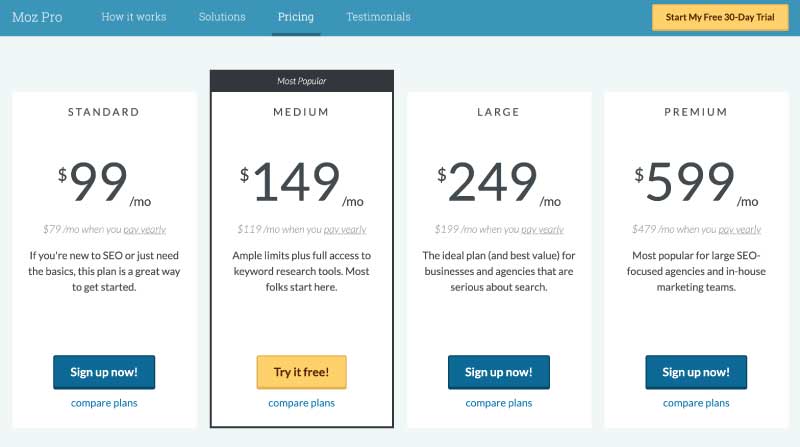
SEMRush
Price: Starting at $119.95/month
I use SEMRush almost every day. There are lots of useful SEO tools provided by SEMRush for gauging how well your pages are doing for various search phrases. One added element that SEMRush inserts into rank tracking is a measurement of the value of your pages based upon what it would take to get traffic to the page using paid traffic through Google AdWords.
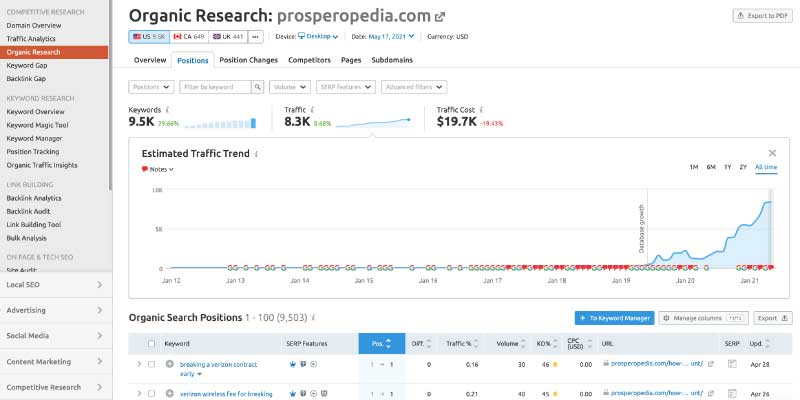
After I publish a page, I come back after it’s indexed and use SEMRush to determine what phrases that page is ranking for. I look for long-tail phrases that my articles naturally rank for, and I update my articles to include those specific keyword phrases so that the page’s search ranking for those terms will improve. This helps me bring in a lot of long-tail traffic.
SEMRush also has its own set of tools that do many of the things that Moz.com does, including evaluating the backlink profile for your domain and for specific web pages and evaluating the technical aspects of your website.
I like to look at the progress my websites are making using SEMRush’s dollar value assessment, especially since it helps me to know what level of monetization I should be getting out of my website overall and out of any particular page.
SEMRush also has a lot of features for doing paid search. I focus much more on organic search (because it’s free and better quality), but their paid search tools are worth trying out if your business is using paid search.
Ahrefs
Ahrefs has a toolset that in many ways is similar to Moz.com and SEMRush, but it presents the information differently and uses. Ahrefs is more similar to SEMRush than it is to Moz.com.
Ahrefs includes tools for doing keyword research, evaluating backlinks, checking on technical aspects of a website, and monitoring ranking campaigns. Ahrefs (as its name suggests) started out as mostly a link checking tool, but it has in recent years added features to make its comparable to SEMRush, Moz.com, and other SEO tools.
One of the advantages of Ahrefs in terms of its tools over others listed here is that it uses data to provide insights that some of the others don’t. For instance, its keyword tool provides an estimate of the number of clicks you can expect if you rank at the top for specific keyword phrases.
Although Ahrefs presents similar types of data as SEMRush, its database and the way that it presents the data is preferred by some SEO experts, while SEMRush’s style is preferred by others. SEMRush has slight more expensive pricing than Ahrefs.
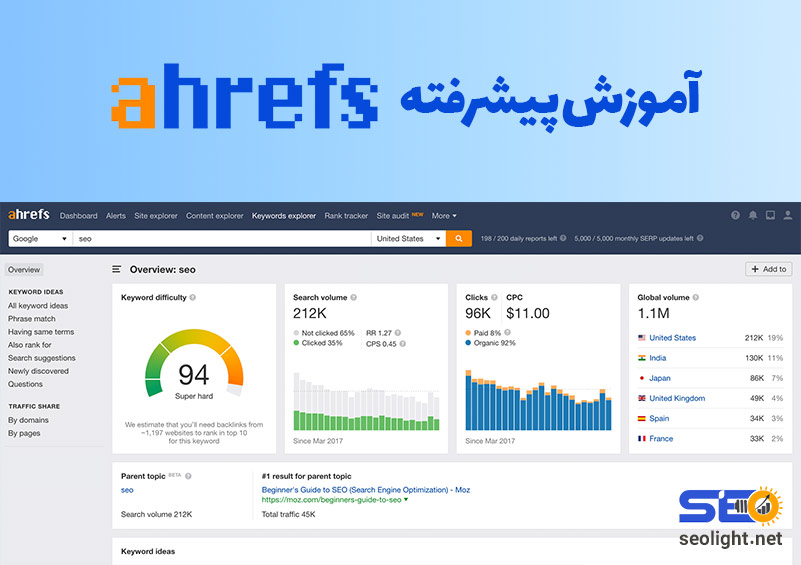
Yoast WordPress Plugin
Price: Free
This tool is a plugin that only built specifically for WordPress. Almost 40% of websites online today use WordPress for their content management system. Yoast is one of the top plugins used by WordPress websites.
The Yoast SEO plugin allows you to easily update attributes of a pages meta data, and it provides an inline evaluation of how well your post targets the keyword phrase you input as the “Focus keyphrase”.
There are other things the Yoast plugin does as well, including allowing you to determine how your post will look when it’s shared on Facebook or Twitter, and it also gives feedback on the readability of your article content.

